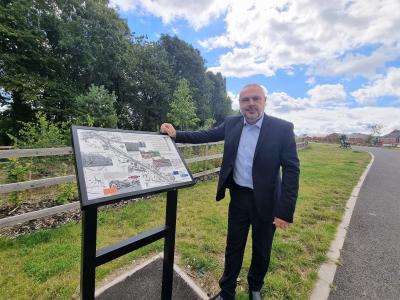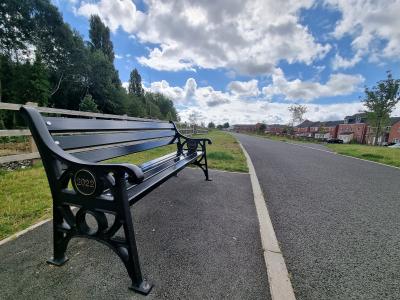The work at Fowlers Park in the city centre, Ward Street in Bilston and Pendeford Park aims to increase biodiversity, improve access and encourage visitors.
City of Wolverhampton Council led a bid for funding for the improvements as part of the Black Country Blue Network 2 project, a partnership project between Wolverhampton, Walsall and Dudley Councils, Canal & River Trust and Severn Rivers Trust.
A total of £1.5 million was awarded by the European Regional Development Fund(ERDF). Of this, £756,000 was used in Wolverhampton with other money helping to make improvements at a variety of sites across the Black Country.
In the city’s Ward Street, the funding has helped to reopen a site which had been closed for a number of years.
Paths and seating have been installed, landscaping has been carried out and grassland and meadows have been created, attracting a variety of insects and improving biodiversity.
Woodland has also been planted to improve the variety of trees and hedges as well as the natural habitat for native species.
Pendeford Park has seen the creation of a new wildflower meadow, installation of bat and bird boxes to support the local bat and bird populations, tree planting, woodland management and improvements to access paths.
At Fowlers Park, tree planting was undertaken to improve the variety of species and encourage a diversity of wildlife. Wildflower meadows have been created and improvements to the park lake which has become overgrown have been made.
New signage and disability friendly improvements to access points were also carried out to encourage more visitors to the area. The work has helped the park to secure a prestigious Green Flag Award for the first time. The award is the international quality mark for parks and green spaces.
Councillor Craig Collingswood, cabinet member for environment and climate change, said: “The fantastic work we have carried out across these 3 green spaces has not only improved our city for a wide variety of plants and wildlife, but has also meant we have been able to improve access for local residents and open up places for everyone to enjoy.
“We are grateful to the ERDF for providing this funding specifically for these important environmental projects. This work had been something we were keen to carry out and thanks to the extra funding, we were able to make it happen.
“In 2019 the council declared a climate emergency and the tree planting carried out as part of this project is a key way of us helping the environment by supporting wildlife, improving air quality and absorbing carbon.”
City of Wolverhampton Council has been responsible for project managing the work across the whole Black Country Blue Network. The first phase of the project was completed in 2019, and on behalf of the partners, the council put forward a bid for further funding from ERDF in 2021.
The project originally aimed to improve 122 hectares of green space linked by the local canal and river network across the Black Country. However, during the course of the project, 141 hectares have been improved.



